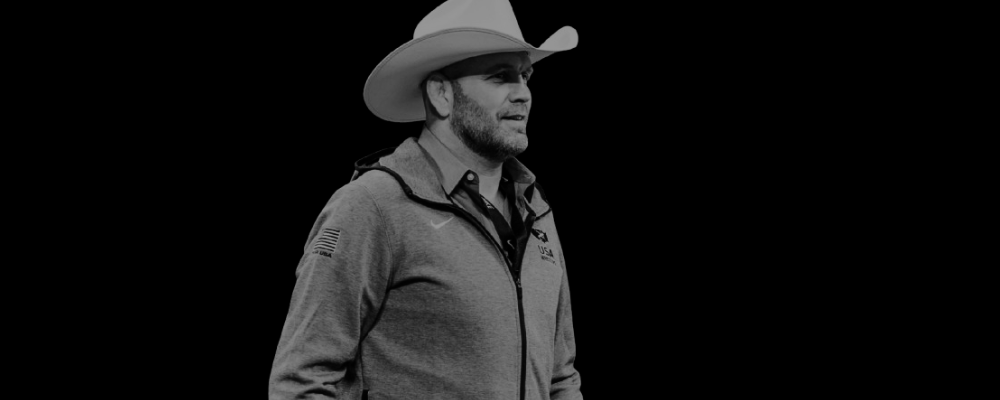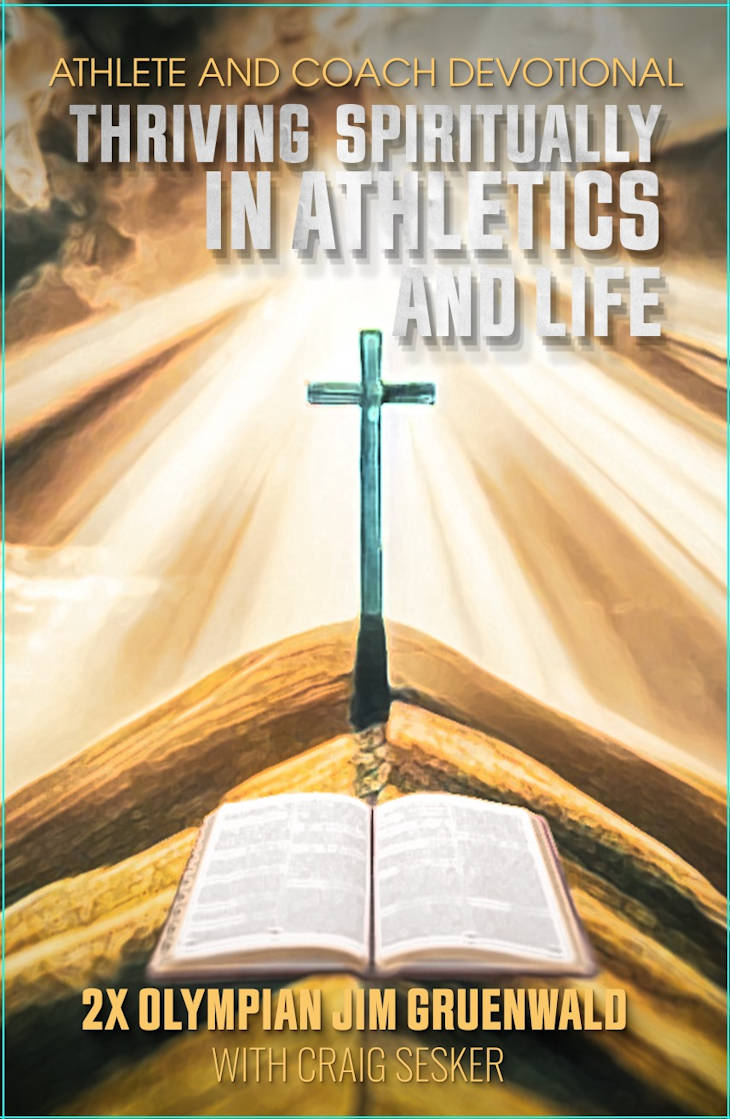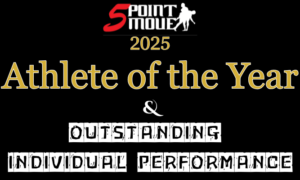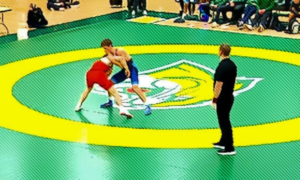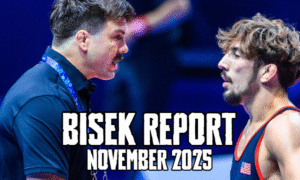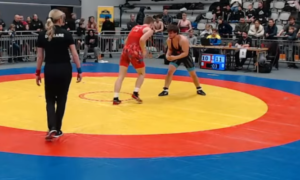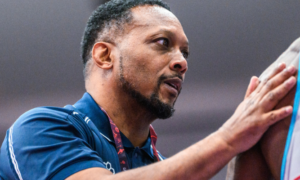Former National Team head coach Matt Lindland was responsible for helping deliver countless memorable moments to the US program throughout his tenure, which began in 2014 and came to an end in the summer of ’22. Under his command, Team USA won the Pan-Am Games title in ’15, a feat the country had not accomplished since ’85. There were also five World-medal-winning performances during Lindland’s time as the program’s chief. Andy Bisek earned consecutive bronze medals (’14 and ’15), Robby Smith got one himself (’15), Adam Coon (130 kg, NYAC/Cliff Keen) trucked his way to silver (’18), and G’Angelo Hancock grabbed bronze in ’21.
Then there were the athletes who performed brilliantly at the age-group level. From Kamal Bey (77 kg, Army/WCAP) and Cohlton Schultz (130 kg, Atreus WC) winning World titles in ’17 (at Junior and Cadet, respectively) to Alston Nutter (67 kg, Army/WCAP) and Peyton Omania (67 kg) triumphing for bronze in ’19, and several others making the podium along the way, these superlative showings demonstrated the type of promise residing in the nation’s up-and-coming collective. Lindland was especially pleased, for increasing youth development stood as one of his highest priorities. Even now, it is this area for which he deserves, and often receives, the most credit.
More than any other National coach before him, Lindland consistently, loudly, and articulately campaigned for an influx of resources and opportunities to attract young wrestlers to Greco — not just to expand participation numbers, but because he sensed that the Greco-Roman program’s very survival will only be made possible by recruiting more youths to the style earlier than has been the norm. Lindland knew then what others failed to realize until later: if America continues to depend on post-collegians to fill or augment the Greco program, the rest of the globe will continue to zoom past the US both developmentally and competitively. Hence, Lindland played a critical role in the formation of the Elite Accelerator Program at the US Olympic and Paralympic Training Center seven years ago, invested plenty of time in assisting the staff at Northern Michigan University’s National Training Site, ran youth clinics across the country, and empowered coaches like Lucas Steldt and Bill Kahle to raise the bar when it comes to training teens for overseas competition.
Of course, much of this was always evident inside the litany of Coach Lindland’s Weekly Report articles on this platform, but that one subject area just scratches the surface. There are many classic editions of “Lindland Reports” which included him discussing principles of faith, training protocols, technique breakdowns, re-tellings of athlete performances, stories from his own competitive career — and how ardently he endeavored to foster honest, continuous channels of communication to and for his wrestlers. Lindland never lacked for transparency, and so he walked you through his own thought processes step-by-step, thereby rendering a blueprint for other coaches to follow should they attach the same value to meaningful discourse and the trust it creates. A zealous reader, Lindland himself was an open book whenever we recorded and, thankfully, a substantial amount of the wisdom he shared is preserved on 5PM for everyone to access as they see fit.
This first of a three-part series (featuring select excerpts) from Coach Lindland’s Weekly Report deals with three topics: love, leadership, and discipline.
Love
From Coach Lindland’s Weekly Report: What’s Love Got to Do with It? (March 2, 2017)
“I think love is essentially one of the most powerful forces in the world. It’s what God gives us and, in the Bible, they talk about many different kinds of love. There is brotherly love, romantic love, and agape love, which is love for God and God’s love for man. There are many different kinds of love. The love I’m speaking of is brotherly love. When we talk about paddling the boat — which we’ve discussed a lot at great length and is our theme — to get those six athletes in the boat working together and in-sync, when we talk about that we have to have a vessel. Our vessel is the raft, which represents the sacrifice we make, the team makes, the coaches make, the athletes make. It is the sacrifice. And the acronym we use for R.A.F.T. starts with responsibility. You have to be responsible for your own actions and understand those actions and their consequences. You have to think of others. That’s love (laughs). You have to think about your brothers, your teammates. If I do this, how does it affect my team, how does it affect our program?
“The first thing I talk about is responsibility, the “R” in raft. The next thing is the actions, the “A”, as in what actions are you going to take, good or bad? If I take this action, I’m going to get this result. If I do this action I’m going to get some other result. What actions are you going to take? Again, if you take actions out of love, it is going to make sense. Then family, the “F” in R.A.F.T. When you say “family”, well, what does that mean? It’s very cliché in sports, so you have to define it. So it’s “F”, forget about me, how do I love you? It’s not a romantic love, it’s brotherly love. I care about you, I want you to have as much success as I have. If you have success, I’m not losing success. You’re not taking something I’m not going to get. We’re in different weight categories. Even if we’re at the same weight, You beat me out, I love you brother, so go represent our country and win that medal this year, I’m going to be your training partner.
“I’ve had guys who didn’t make Olympic Teams but they were so valuable because they loved their teammates. When I was competing, those guys, that was their character, that’s who they are, and it is really important in what we’re trying to do. We’re not just developing great wrestlers and athletes, we’re developing great men who can reach their full potential in their character.
“In the acronym, that last letter is “T”, which is trust. We have to trust one another. In a family, you love your family members and you have to trust each other. Sometimes that trust gets broken and we have to repair it, but it takes a LOT longer to build trust than it does to remove it. That’s why you have to be careful and be responsible and think about your actions. And when you think about the team, think of it like a family. That’s why I think it is really important, that if you understand why you’re doing this and you love what you are doing. Nietzsche had a quote that said, “A person who has a why to live by can bear almost any how.” When we’re training and competing, you have huge high’s and huge low’s, but you’ve got to remember the why to live by, which is, I love what I’m doing and I’m grateful to wrestle every day. I’m grateful I get to live at the Olympic Training Center and my job is to work out and do what I love to do.
“So, that’s love. That’s what we’re talking about when we’re talking about love.”
Leadership
From Coach Lindland’s Weekly Report: 7-11 (July 11, 2017)
“I put them in situations where they are out of their comfort zones a lot of times. Whether that is leading a warm-up in front of a bunch of their peers, or taking them out and putting them on the river, or just different training situations and modalities where you can get athletes out of their comfort zones and you can make them uncomfortable. It makes them grow leadership skills.
“As for what are the immediate benefits? You develop more of the individual. I think a coach’s job is not to just develop the athlete, but the full person to help the individual. It goes along with the Olympic creed, which is about fulfilling your potential. If you’re not developing leadership skills, if you’re not developing character along the way, it’s hard to just have an athlete. We’ve seen example after example of athletes who have been great in the ring, on the courts, or on the mats, who just don’t make it to the finish line. They don’t get on the podium because they lack the discipline, they lack the structure, they lack the character qualities that it takes to be successful at the highest level. So you need to develop the whole person along the way. Certainly, we use wrestling to do that as our vehicle, but there are so many opportunities on the mat and off to keep building up these athletes and their character as men.”
From Coach Lindland’s Weekly Report: January Camp 2020 (January 7, 2020)
“Think optimistically. Even when things go wrong, look for a silver lining and become an encourager. Be there to lift others up. If you see someone struggling that day on the mat, maybe after practice you can lift them up and find something positive they did during that training session where they’re just feeling worn down, beaten down, and discouraged. That means acting like a leader, and knowing what that kind of leadership looks like.
“Encourage and set that example for others to follow — because people are watching. No matter what or who you think are, people are watching how you respond and how you behave. And they are definitely going to follow someone who is an encourager more than they’re going to follow someone who is negative. You need to set a good example.
“The second one is is just constantly improving our habits. How’s your sleep? How is your diet? Are you doing proper recovery? How is your lifestyle? Is it conducive to success? Look, we don’t need to read a new book or listen to a new podcast to get some some cutting-edge advice. I think we all know what the right things are to do. And if we don’t, then certainly ask. But you most likely know what you need to do, whether you read it through a book or heard it from a podcast you listen to. But you could always just lean on the advice your coach gave you before, or your nutritionist or your strength trainer.
“Third is to be content. We are certainly blessed in this country. We have so many blessings and opportunities, but a lot of times I think we we look at what others have and we covet. I think that’s a big problem when we want to have things that other people have. The grass isn’t always greener on the other side.
“You know Philippians 4:13? It says ‘I can do all things through Christ who strengthens me.’ I think that’s a passage that a lot of athletes refer back to. I mean, you look at Jon Jones, he’s got it printed on his chest and shoulder area. But we really don’t read the verses leading into that, which were written by Paul, who at this time was sitting in a Roman jail. He also says “I rejoice in the Lord greatly that now at last you have renewed your concerns for me.” Paul just received some provisions. He is in jail and someone sent him some money. They sent a guy to carry a bag of money so Paul could get some food. ‘You were indeed concerned for me, but you had no opportunity to show it. I am not saying this because I am in need, for I have learned to be content whatever the circumstances.’
“So here’s a guy who is sitting in jail, doesn’t know if or when he is going to eat unless these funds get to him, and yet he’s content. He’s content sitting in jail because he is serving his purpose. He goes on to say, ‘And I know how to be brought low, and I know how to abound.’ We are all going to have struggles. We are all going to be brought low. We have wins, losses, high’s and low’s, but the thing he says here in the second part is ‘I know how to abound. In any in every circumstance, I have learned the secret to facing plenty and hunger, abundance and need’ (Philippians 4:12). So whether he has money or food, or neither, Paul is content. And I think that’s a great lesson. We should be thankful.”
Discipline
From Coach Lindland’s Weekly Report: Stepping Into Chaos (February 6, 2018)
“The acts of life we repeat everyday, we need to automate those things. They need to be turned into stable, reliable habits so that they lose their complexity and gain predictability and simplicity. We have to have simplicity, discipline, and structure off the mat. If you cannot make your bed in the morning, clean your room, fold your laundry, and put your clothes away, how do you expect to handle life when you step on the mat? Because when you do step on the mat, you’re stepping into a chaotic world. When you get on that mat, it is absolute chaos, which is what is so fascinating and intriguing about our sport.
“You don’t know what’s going to happen. You may have wrestled that same athlete before and it’s never going to be the same match. The same guy, you could wrestle the same guy 20 times and you’re never going to have the same exact score, the same exact match that you had before. Therefore, you have to understand the value in incorporating a disciplined structure off the mat because, when you step on the mat, it’s going to be chaos. If you don’t have one foot in chaos and one foot in discipline and structure, it is very difficult to live.
“If your whole life is about chaos, you’re probably waking up in the morning only to roll out of bed just in time to scramble yourself to practice, and then you’re missing one of your wrestling shoes. There just has to be routine, there has to be structure. There has to be this really sensitive routine that can be predictable, because that is what is going to allow you to have success on the mat where everything is chaotic.”
From Coach Lindland’s Weekly Report: Recharged for 2019 (January 8, 2019)
“Sometimes, the hard things need to be done. It is easier to be in a group chat and send a message out. But you don’t get the same human contact. You’re connecting egos and not connecting people, and we are a team of people. We are a program that has to have cohesiveness to function. If we’re always looking for the easy way out, whether that’s for communication or training, then you’re not getting out of your comfort zone, and that is when you grow and can make adjustments, make positive changes.
“I think I allowed that to happen in a certain sense. The guys were like, Here’s the solution. So then it was, Alright, I like the solution, let’s do that. And it didn’t work. We got to where we needed to be on time. The guys all got to weigh-ins, all got on the mats. But at the end of the day, we’re not building those bonds or those connections.
“I was telling a story about things that just seem normal and natural. I sent out a group message — and not only did I send it out in a group message, I also announced it in practice and face-to-face — saying that I wanted to go watch one of our guys wrestle, Alex Mossing. Let’s go watch a dual. And it got me thinking back to when I was on the National Team and a resident athlete. We looked for opportunities to have hockey games at midnight or two in the morning, or to go fishing together. Just different activities, right? If we had the chance to go watch an hour dual meet at a college that is 20 minutes away, especially if one of our guys was wrestling, everybody would have made an effort to do that. We would have shuttled or carpooled together. I made it easy, I got us a van. I wound up cancelling the van because the few guys who did end up going drove themselves. There wasn’t a need for a big van.
“Those are the types of things you do together that build those bonds and build that trust outside of the training environment. It allows you to work together and rely on one another in those training environments when the pressure is on. That’s when you figure out who you really are and how you are going to really respond when the pressure’s on. It’s not when you are in comfort, it’s when you are in the fight and have to rely on one another and count on another. Culturally, we haven’t been doing a good job of that and we have to make some big adjustments as far as that goes.
“So that is an interesting question. I don’t think we can always look at the easiest way. We have to sometimes do what’s necessary, and sometimes what’s necessary is harder.”

SUBSCRIBE TO THE FIVE POINT MOVE PODCAST
iTunes | Stitcher | Spreaker | Google Play Music


